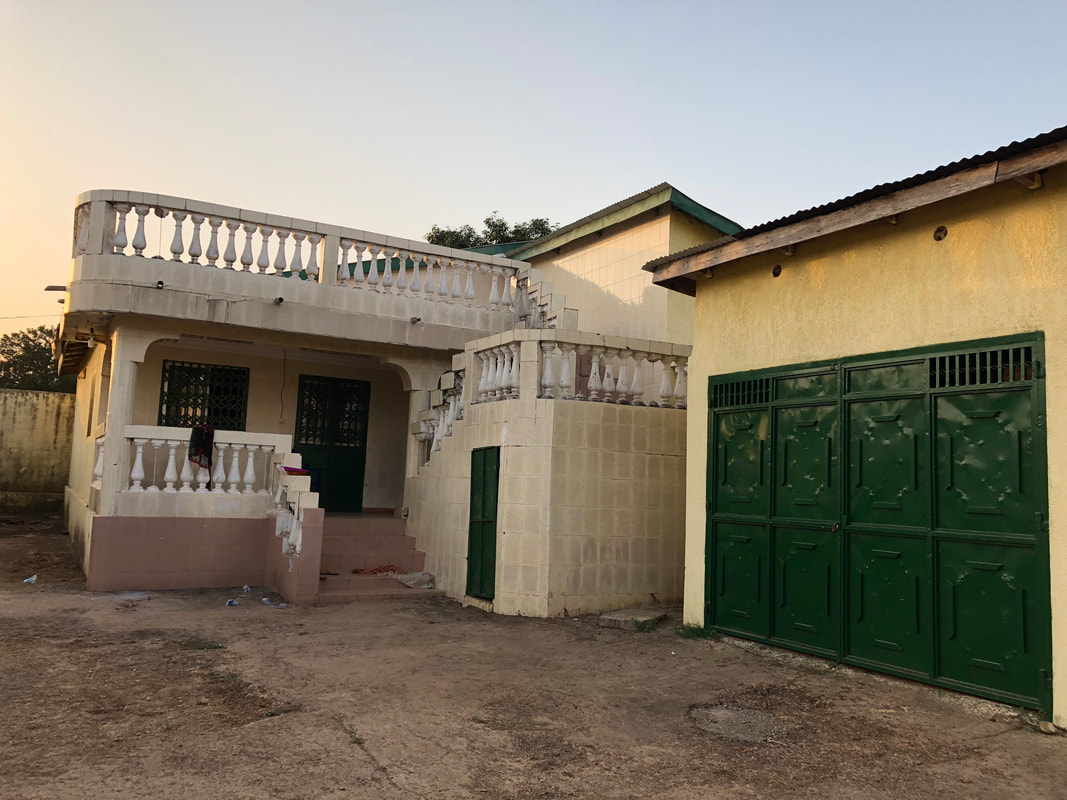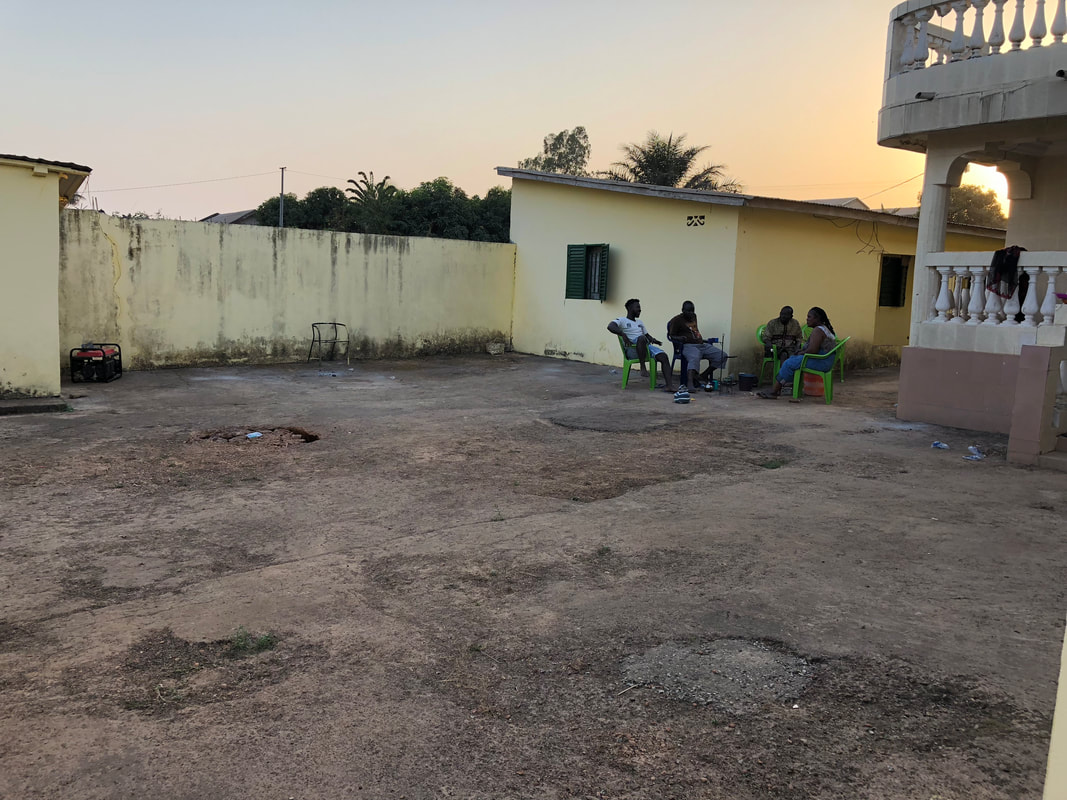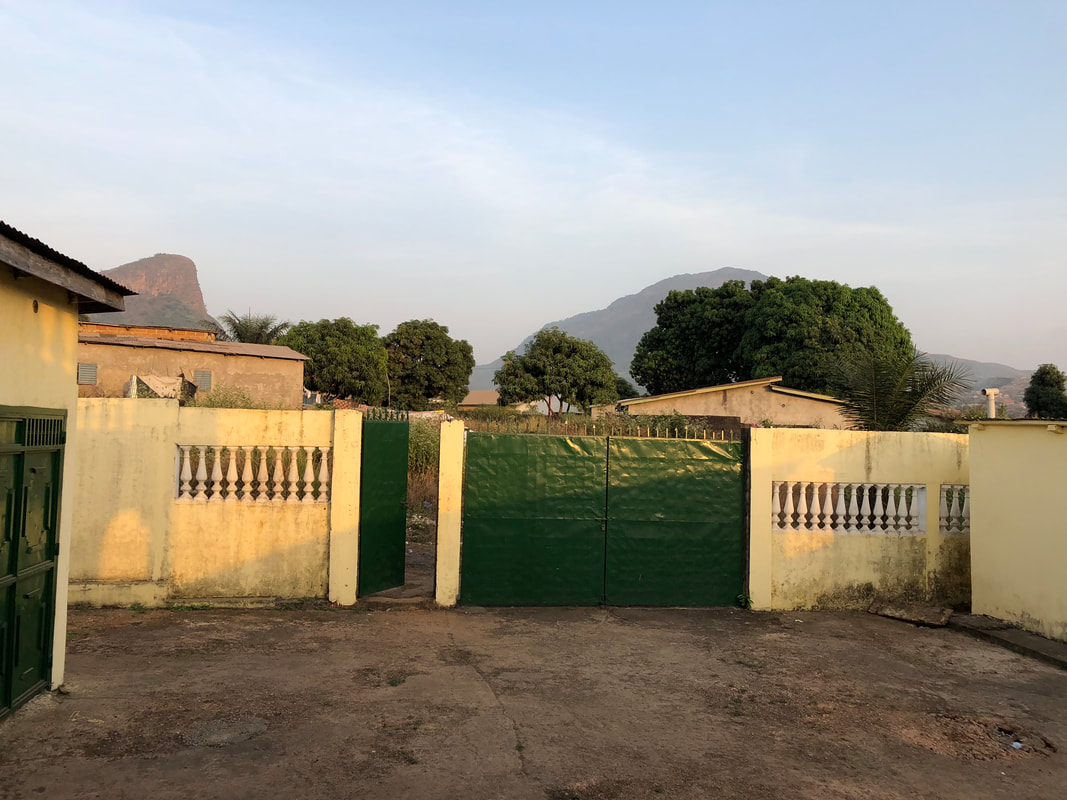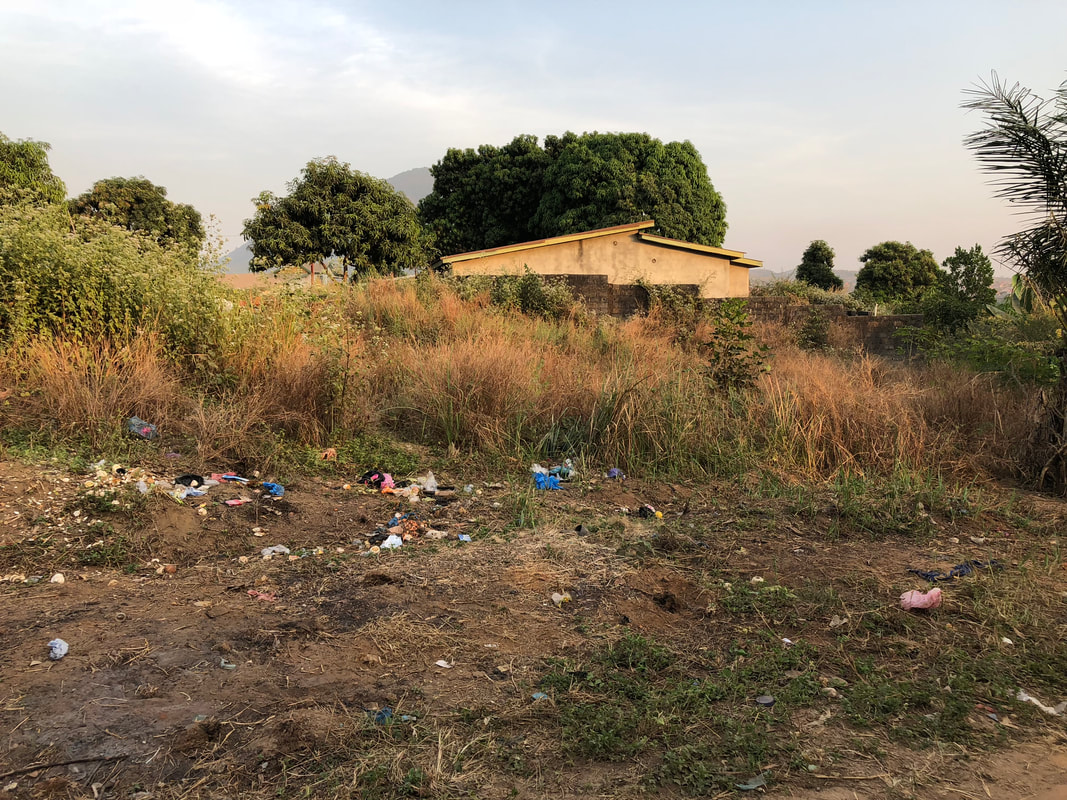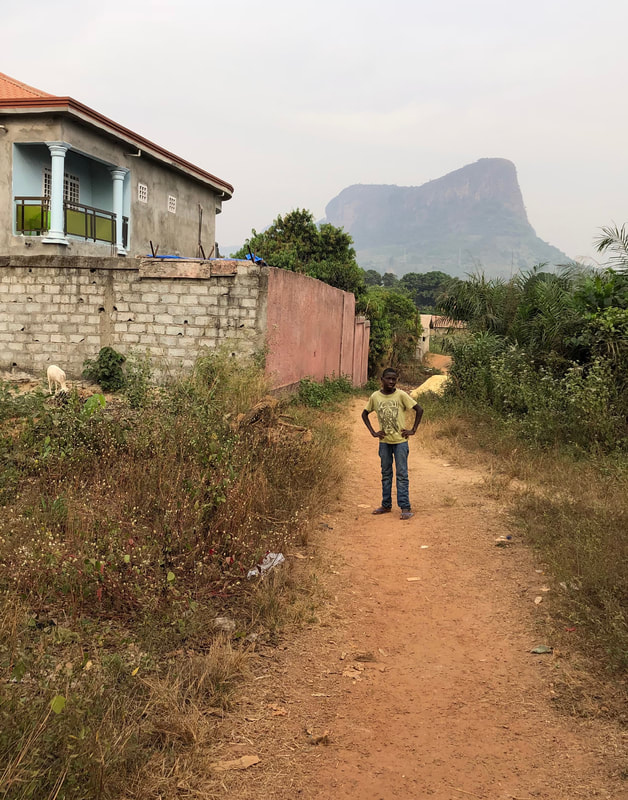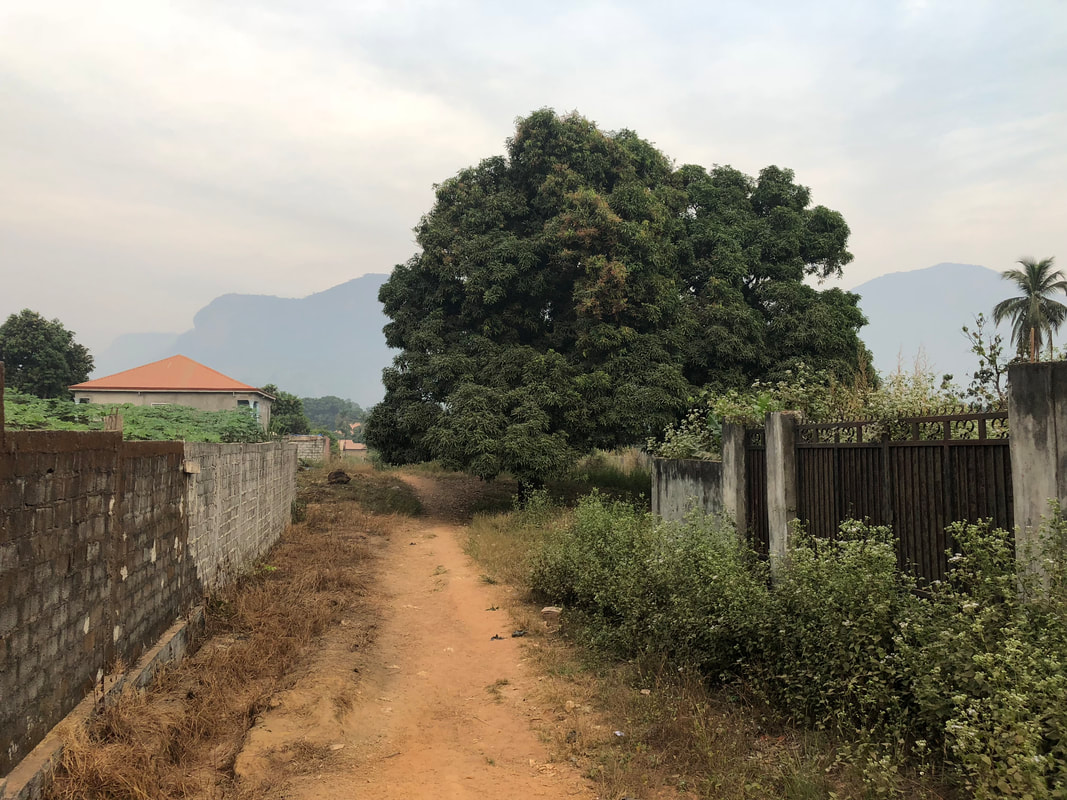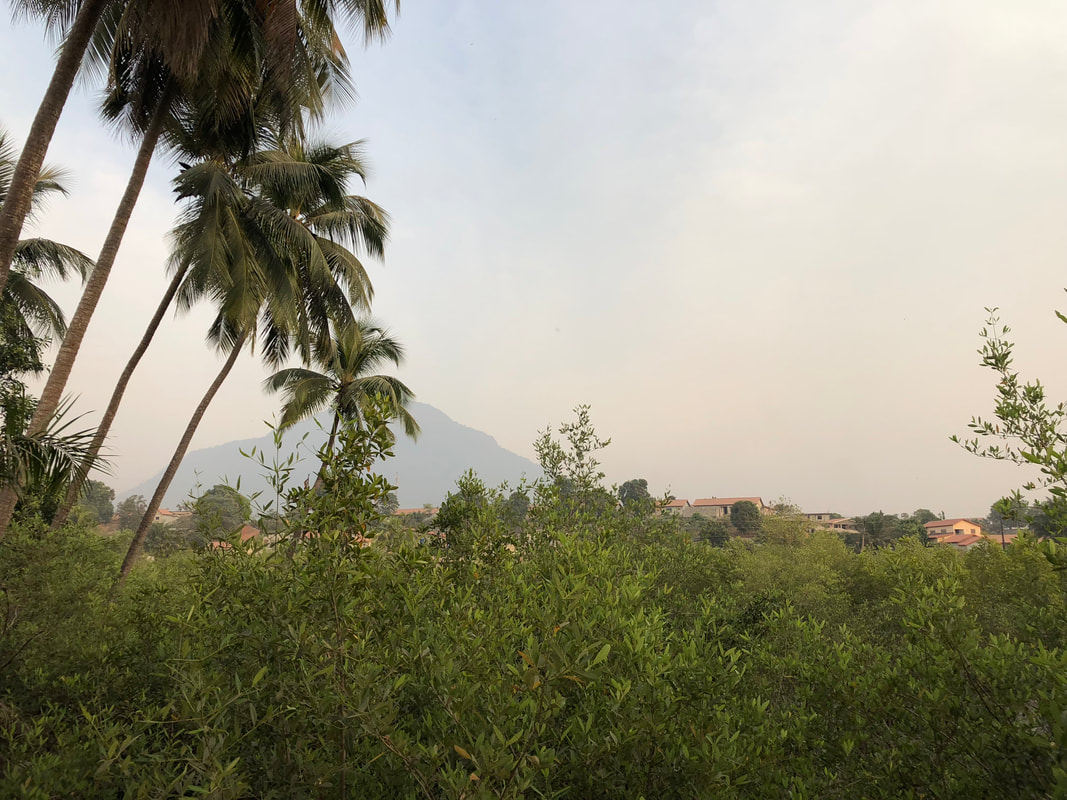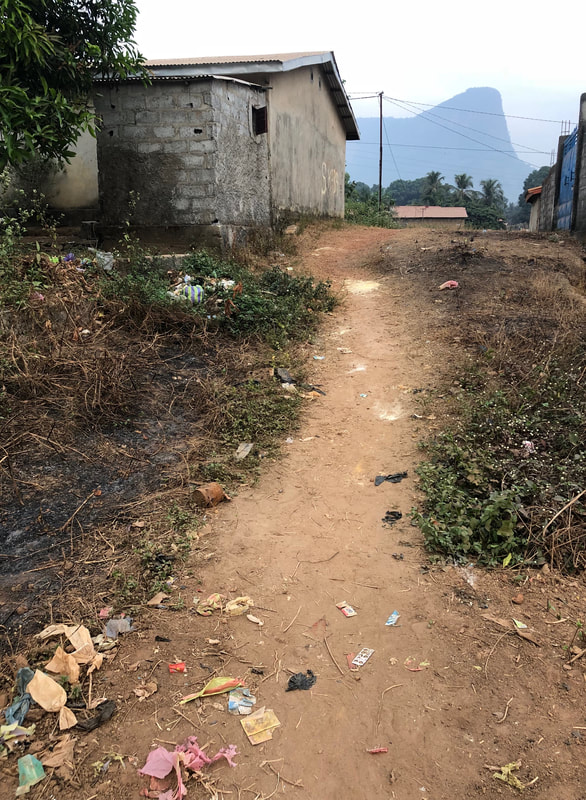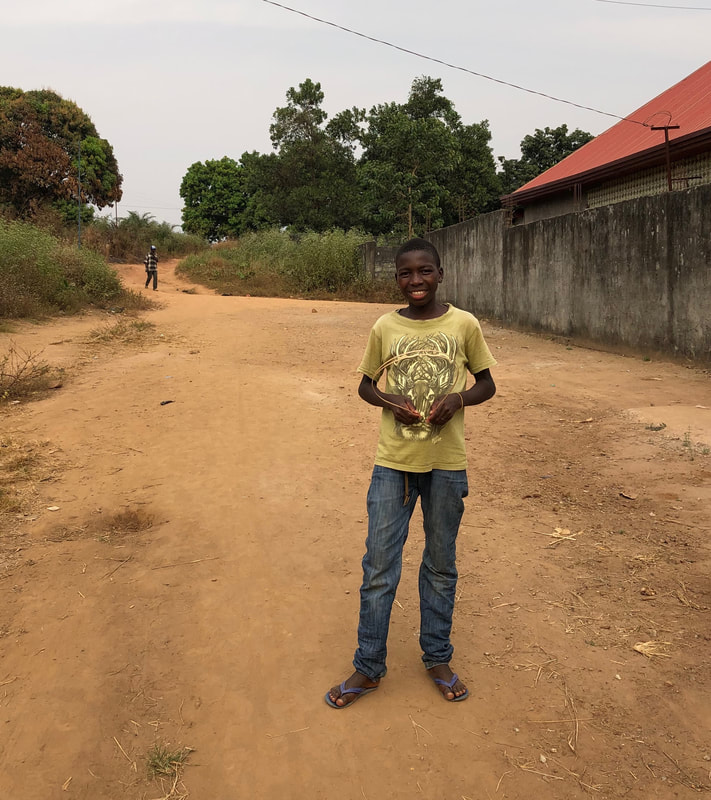|
Back in Ghana in the year 2000, I felt most like a “real African woman” when I could fetch water with some degree of ease – meaning when I could carry a bucket of water atop my head from the nearest village, somewhere around a kilometer or a mile away, back to the shack, both without spilling too much of it down my backside and without incurring an absurd amount of stiffness in my neck. This time, in Guinea, I knew that what it would take for me to feel reasonably acculturated here… would actually be to bring myself to throw my trash in the bush. Though I did consider the other alternative – not to leave it behind in my room for my hosts to eventually toss into the bush, but to pack it up with the rest of my belongings and dispose of it perhaps a little more “properly” (in my ingrained Western perception of where trash should reside) back home in the Western world… on my last morning, I finally brought myself to do it – to carry my small plastic bag of odds and ends of trash out in front of the compound and toss it into the bush myself. I suppose, though, the truly acculturated part of that scenario would be not feeling any negativity about doing so…
It was also on this last morning in Guinea that I finally met someone besides Alisco who spoke fluent English – a friend of Mohammed’s (Alisco’s younger nephew, who was probably in his 20’s), who came to visit him during this rare, blissfully quiet morning when everyone else happened to be out. When I eventually joined them on the porch to cut up some fruit, he asked me about my diet, as Mohammed had told him I had mainly just been eating fruit. And as we began to talk quite extensively about health and wellness – mostly about diet (vegetarianism, fruitarianism, breatharianism…), yoga, and Reiki, I was surprised to suddenly find myself having the best conversation I had had the entire time I was in Guinea. Wow, it was so wonderful to actually communicate with someone! Besides Alisco (who had to be away in Conakry half the time), I hadn’t been able to really talk to anyone, or understand anything being talked about, and there had only been a few of the basics of human experience to connect me with anyone whom I had met in Guinea thus far: love (as displayed through care and appreciation for one another), joy (smiles), and rhythm (drumming!). While the men had spent hours sitting in the courtyard talking, I had spent quiet hours in my room, practicing yoga, writing, and reading; I couldn’t share in their food with them, which was always a pretty central social gathering point (though at least they could eat my food, always enjoying the fruit I passed around); and eventually, I had felt so other, so foreign here. At least now, having this conversation, and in the end leaving Mohammed’s friend with a book concerning pranic nourishment that I had brought with to read, I finally felt that I was at least doing something positive in a cross-cultural capacity. As we were talking, I was struck by the fact that Mohammed’s friend was speaking English with a perfect Ghanaian accent. And when I asked him where he had learned English, sure enough, he told me that he had learned it while studying in Ghana, which was also where he had been exposed to many of the things of which we now spoke. Like another Guinean man with whom I had spoken on my plane ride into the country, who also had been living for a stretch in Ghana, he now told me how much he loved Ghana, loved how “free” he had felt there. “Freedom country,” the man on the plane had called it. They both marveled at how easy it was to do what you wanted in Ghana, to move around without hassle, to relax. Indeed, by the end of my stay in Guinea, I, too, for my own reasons, was feeling a renewed appreciation for Ghana – far more than I had been feeling by the time I had left it a couple weeks before, when I had felt so ready to explore Guinea (and someday Mali) – and meanwhile leave Ghana behind me. But now that I had this (albeit brief) experience in Guinea with which to compare it, I could see how good it was for me in Ghana: I appreciated how easy it was for me to have some independence there, to feel comfortable, and to connect with the people without much of a language barrier. The type of conversation I was having with Mohammed’s friend, for instance, had been so much easier for me to come by back in Ghana. And I could see that it wasn’t just the English language, either, that made it easier for me to be there, but also the fact that there were simply so many more Westerners there. And this made me see the relatively strong tourism industry in Ghana, which I knew had a great deal to do with this, in a new light. In the past, I had been prone to focus on the more negative aspects of tourism – particularly all the disconcerting ways in which the Western influence tends to change or disrupt non-Western cultures, too often to the point of so many traditions and languages and other key aspects of a culture, or even an entire culture itself, becoming lost. But now I recognized, and was grateful, that the tourism industry has contributed a great deal to setting things up for what I saw as a positive cross-cultural exchange as well. Because in this rapidly changing world, on which the human impact is proving so critical (and in which globalization has already made the Western/capitalist influence fairly inescapable), I think a healthy cross-cultural exchange can be of the utmost importance. (And cultures, I found it reassuring to remember, are not static but living, and therefore always somewhat shifting and evolving – not just in our modern age of “the global village,” but as a constant, as a course of nature…) It was a bit to my surprise that I felt such an affinity towards Ghana again, and towards its people. But once again, retrospectively, it felt like… home. And now, as I was preparing to leave Guinea, already I was planning to return to Ghana, to explore some new places I had heard about that seemed a far better fit for me than Kokrobite. Later that night, when I was finally settling into my seat on a Brussels-bound plane, I was surprised to find that the cover story of the airline’s magazine was about the growing health and wellness movement in Ghana – with both yoga and clean diet front and center in the story. And as I read the article, it seemed like another sign pointing me in the direction of Ghana as an easier place to share what I’ve learned, to contribute, to have cross-cultural experience. When I left Ghana in 2000, all I saw for myself back in America was family and education, and it had felt important to learn all I could – back then about permaculture and yoga, eventually dietary cleansing and pranic nourishment – so that I could bring it back to Ghana – to be able to contribute in what I saw as a positive, healthy way to the culture that had given me so much, that had made me so much of who I am today. Though I did feel done with this trip, and had felt so extremely excited to get on that plane, I did not feel at all done with Africa – not even close. This trip broke the ice, but I could tell it was not nearly enough. And besides my feelings towards Africa… I was so enjoying the movement, the change, being around new people and different cultures… As soon as I had left Alisco, his wife, and his nephews Youssouf and Sekou outside the departure hall, after sharing a heartfelt farewell with each of them (and after we had first endured a torturous two hours of crawling through traffic – and the extreme of air pollution that goes with it over there – to get to the airport)… as soon as I had stepped through the gate to the departure hall and started to walk forward on my own again, gloriously alone… I had suddenly felt so HAPPY, and lighter and lighter with each step, feeling a sense of freedom and independence returning to me. Oh, how I love to be alone! On my own! Moving through my life! Glory be! I felt so free! As I relished the entire, long, wonderfully enjoyable journey home, I luxuriated in all the space I felt, even in my typically tiny seat aboard two full flights – plenty of space in which to feel my whole self, and my movement along my path. I loved the new airports through which I passed (especially Conakry’s sweetest of small airports – could be my all-time favorite), enjoyed learning about new countries from the African men sitting beside me on my flights, watched movies, wrote… And I could feel the travel bug stirring inside me, making its way to my heart, preparing to pull the strings and steer me towards another trip. “Yes, you still love traveling!” my inner guide shouted at me. “Keep going!” As much as I have loved finally finding some sense of settlement and home and community in Santa Cruz, there’s something about feeling my little self loose out in the big world, beyond the safe embrace of my sweet community, that just makes me feel so… alive!
0 Comments
In addition to what was laid out in Part One of this post, “the plastic situation” was the other big factor playing a role in how I was feeling about being in Guinea. There were several aspects to this, many of which I could deal with for some time, but ultimately… I found that I just couldn’t hang with the plastic-burning fumes. I had known about and expected the burning of the trash, plastic and all – and I had actually already gotten a bit used to this in Ghana. Maybe I could have lived with that (and other pollutants that I usually manage to steer clear of, like the occasional cigarette now being smoked in the courtyard…), and maybe I also could have dealt with the generally prolific use of plastic bags – the fact that every single time anything was brought to the house, often for me (as, again, the language barrier amounted to a lack of independence – no shopping for my own fruit at the market), it was brought in yet another plastic bag…
Just like in Ghana, the discarded plastic bags were everywhere here, a part of the landscape. And this didn’t bother me. The plastic everywhere didn’t even look like “litter” here; it just looked like… something that existed in this world, alongside grasses and trees and birds and goats and humans… One of the things I had always so loved about living in Ghana was how real it was there. For one thing, I loved how real my own life seemed to become without all the many distractions with which I had grown up – the television or movies, or even libraries full of books to read – as if (at least for someone as smitten with story as I am) one’s own story becomes the story without so many other stories to interfere. And I loved how another aspect of this “real” factor was that things were more out in the open there, more blatant or obvious – whether the corruption of the government, the trash situation, or the mystic workings of one’s own beautiful life. As for the trash… here in America, I think for most of us our trash tends to be “out of sight, out of mind” – sent off to some landfill where, unless we are one of the unfortunate souls living near it, we don’t have to be reminded of it; for most Americans, someone comes to pick up our trash for us and it disappears from our little realities. And though more and more of us are now aware of the evidence flooding in that in fact our trash ends up wreaking havoc on so very many of the creatures of this world, whether they be of land, sea, or sky… I think we perhaps still like to think of our trash being in some safe place, and moreover that all this plastic we use is okay, too, because when we’re done with it, we stick it in a recycling bin. Never mind the carbon footprint involved with the recycling process itself, in which our recyclables are mainly shipped to the other side of the world, or the fact that now most of the countries that used to do the recycling job for us are no longer even taking most plastics – so they are often not even being recycled at all, but just rediverted to landfills or incinerators… “Out of sight, out of mind,” right? …But in Ghana and in Guinea, and I would imagine probably in much of the rest of West Africa as well, there are no such illusions, and the trash produced can be seen all around – just part of the landscape. On my first day in Guinea, I discovered where our trash went – right out in the bush in front of the gate to the compound (great, at least, for fruit peels, which the goats would eventually wander over and consume). And as I stood gazing upon not only so much trash, but also the big burn marks on the dirt road where piles of the trash had clearly been set ablaze… I suddenly somehow reached a new level of feeling at peace with the burning of the trash, plastic and all. It felt like hitting upon a pinnacle in the experience of nonjudgment, a clarity of nonduality – no good or bad – this is just the way it is. …No good or bad, just the way it is – to see the whole plastic situation in this way, to experience it this way, felt like a real accomplishment for me. …But coming to this point of view did not mean that I personally wanted to choose to contribute any more than my usual amount of pollution to this planet (the amount that I have come to accept as the best I am willing to do as I travel through my life in the modern world – many compromises of my lofty ideals of sustainable living having been struck along the way). It’s one thing to observe all that trash in the landscape and feel fully accepting of it, at peace with it, but it’s another thing to participate after nearly a lifetime of efforts to live as eco-friendly as reasonably possible. And it’s also one thing to see the plastic all around me and quite another to actually breathe the fumes from it burning. And now I’m not talking about just the kind of burning outside in the general vicinity that I had already become used to, but suddenly a much more intense burning, just outside my window… I think I hit a turning point when a coal stove was brought to the courtyard, mostly for the men to use to make tea, as their food (nearly always rice with sauce) was cooked by a woman in town, and I saw – and smelled – the method of lighting the coal – which was to use knotted-up plastic bags as the kindling. Wow those fumes were toxic! I couldn’t hang with it – if I was too close or downwind, I’d have that awful feeling of brain-fry… For my own fires, I used scraps of paper to get the coal lit – as a writer, I always have used-up scraps of paper around. But outside the realm of my own room, everywhere else, all around me… no paper and plenty of plastic – plastic everywhere. If someone had to go out to get some kindling to light a fire… it wasn’t sticks and leaves that were brought back, it was sticks and plastic bags. But most of the time no one even had to go fetch kindling, because usually any time the stove was lit, there would be a small amount of fresh coal brought to the courtyard – in a plastic bag – which then became the kindling. Most of the friends who had been there had told me how “rough” Guinea was. And this had made me imagine less Western development, dirt roads and simple living – something a little closer to how I had previously been living in Ghana. And as that had been my favorite way to live out of all the ways that I have experienced so far in this life, it sounded appealing. But this other sort of “roughness” I now found was certainly not something I had imagined, and it surely was not at all appealing to me. …So what to do about it? …I knew from my past in Ghana that implementing change is generally a long, slow process. Even to get Koro to refrain from taking plastic bags at the market had been quite the battle – because he didn’t want all the women selling produce to look at him like he was crazy. In the two weeks I had just spent in Ghana, it had actually felt like some small improvement in the consciousness around plastic might have been made over all these years I was away, simply because, although all the women from whom I bought produce started to put everything in plastic bags, they didn’t act surprised or make any kind of fuss when I told them “no bag” and put everything in my cloth bags from home; this was an improvement over the reaction I had gotten 18 years before. But unlike back in Ghana, here in Guinea, where I was not doing my own shopping due to the language barrier (and where one trip to the market – accompanied, of course, by Alisco’s nephew Mohammed – was honestly enough for me, as it was so enormous and crowded and busy and crazy that I really had no desire to go back), the plastic bags just kept coming, every single time anyone was sent for fruit, or a bottle of water, etc.; and this just did not sit well with me. (And what to do about drinking water was another issue, with impacts on both my health and environment – but I will spare you the details on that one.) Here, where I was not only a guest but eventually even began to feel almost like a pet – a creature who was loved and well cared for, and who loved those caring for her, but was unable to communicate much more than love and gratitude (“thank you” was the first phrase I learned in Susu, and it was by far the one I used the most often), I in no way felt that it was my place to initiate some kind of change. I am not one who loves to have so much done for me, so already I was not in the most comfortable position, and to ask the people caring for me to change their whole way of doing things definitely seemed too much to ask – especially when it came to lighting the coal stove with plastic bags, which was the biggest issue for me, as there were so many different men using that stove, making tea on it numerous times a day. Not to mention that I couldn’t even speak a common language with anyone besides Alisco to even begin a discussion about all this! And Alisco was so busy with family matters in Conakry that I wasn’t looking to add to his load – I tried to burden him with my own needs as little as possible. I also got the very strong impression that amongst the people surrounding me, there was zero idea of single-use plastics being a not-so-good thing. Besides the steady flow of plastic shopping bags making their way to the house, there was one other thing I saw happening with the single-use plastics that I found particularly striking. In West Africa, in addition to the spring or other types of water sold in plastic bottles, there are little plastic bags of purified water for sale, which I would imagine the people around me were sometimes buying because they were being sold cold, as these were the same people who also were drinking the local water straight from the wells – so I doubt that it was a purity issue that prompted them to buy this other water. But they would also use that bagged water to rinse things off or wash their hands – the same exact things for which they would use the well water; it seemed to be that whatever was most within reach was what was used. All those little plastic bags, thrown empty onto the ground, would eventually be swept out into the bush along with the rest of the trash, and all of that eventually would be burned. This is how things are done. And I could accept that – did accept that. But it was also a difficult position in which to be: eco-conscious, culture-conscious, conscious of that old worn-out Western “we know better” mentality, conscious of all that privilege inherent in my upbringing in the West (and unconscious of plenty aspects of it as well, I’m sure)… and just watching the plastic bags build up – much of which was because of me, totally dependent on my hosts. And ultimately, the routine burning of plastic right in the courtyard… and that feeling of brain-fry… that much was definitely not okay with me. I am not one to mess around with my health; health and wellness are much of why I live the way I live, why I do the things I do – as most of you know, I’m all about self-care. And I am not one to linger in a situation I find to be unhealthy, if there’s an option for an exit. And so I didn’t. By the second week, I had had enough and was making plans for my departure. (And the scary thing was, while the toxic fumes were initially the biggest factor in my decision not to stay, by the time I left, the lack of peace and quiet seemed a much more pressing issue – I had gotten somewhat used to all the burning plastic, which did not at all seem like a good thing.) I knew that what felt most important for me to do at that point was to continue to focus on the writing, and in this way process my experience in Ghana. I had so loved being alone in Ghana, and having so much time purely to myself to write, and I could see now that for so long, just as I had been yearning to be in Africa again, I had been yearning for uninterrupted time for the writing work, had long felt overdue for this type of inward, reflective period. I had intended to spend just a few weeks at my mom’s house in the suburbs of Chicago on my way back to California, but now, deeply craving more time alone – quiet time alone, I could see that, at this time, the best place for me to find that, and to most easily be able to do the writing work, would actually be there, where I always felt rather “in the cave,” and where I had, for quite some time, been wanting a long stretch anyhow. And so I began to plan my early return (which was not so easy with no internet service – big thanks to my amazing mom (who was beyond overjoyed that I did not want to stay in Guinea) for arranging my plane ticket back). As for the trip to Guinea… I simply felt like there was always something I had needed to do – and now I had done it. And if I didn’t feel to stay, I did not need to stay. It did feel a little surprising, though, that I did not feel at all disappointed about this situation not being the right fit for me. (Seeing the disappointment on the faces of others, however – Alisco’s nephews, etc. – these guys I loved, was the one thing that made it just a little hard to leave…) On the contrary, I just felt a huge sense of freedom. There was a relief in having played out the intentions I had had for so many years, to now be free of them, to say goodbye to some vague visions I had had about Guinea just as I had said goodbye to so much of my past desire concerning Ghana in the weeks before. Ultimately, this experience in Guinea felt like another “letting go.” Having finally returned to Africa, having fulfilled this huge sort of… obligation (to myself) I had felt for so many years, my future now felt wide open. Though it seems extremely likely that I will be in Africa again someday, the pull on me to be there is no longer so urgent – there is no pressure anymore. And relieved of the weight of my long-time intentions, I already felt more present in the now. Indeed, it seemed that saying goodbye to more of the past allowed me the freedom to be ever more fully in the present. And I felt that I no longer wanted to be anywhere but in the present moment. I didn’t think I was “done” with Africa, but for now… I was done with this trip. Mission complete. A trip to Guinea to study dance (or, in the end, drum) was always tacked on to the return trip to Ghana that I knew I needed to make; as I’ve explained in a previous post, the idea of going there formed immediately after my last return from Ghana in 2000, and since that time, Guinea always remained a part of my vision for a return trip to Africa. But by the time I was actually going… just like going to Ghana by now felt not so much like something that I wanted to do, but something that I needed to do, it was somewhat the same for Guinea. Yes, I was certainly looking forward to spending time with my favorite drum teacher, and yes, I was very much looking forward to the generally slower pace of life and the simpler lifestyle that I knew I would find pretty much anywhere in West Africa – as compared to America. But also… by the time I went, so many years after that dream to be there formed… going to Guinea, like returning to Ghana, had become just another step I knew I needed to take along my path – I just knew, and had known, that it was necessary for me to go, and see what happened. While I was hopeful that I would like it there, I do generally go into any new experience without expectations, and I was not necessarily attached to any particular outcome being associated with the trip. …And perhaps all of this explains much of why once I finally had gone, I actually did not feel disappointed when the reality of my situation there was… well… for me… just not a desirable one. This does not feel like an easy post to share. For one thing, one’s experience simply does not always provide the most comfortable story to tell. But more importantly (and what led to much hesitation over whether it was worthwhile to even share the Guinea story), I loved my hosts dearly, and in writing this next post or two, I felt plenty of misgivings about whether I was being as respectful or polite towards them as I would ideally wish to be. …But ultimately, I always seem to choose honesty and openness over diplomacy or tact; and I found that those things that it would be nice to somehow just gloss over, those things that made it most clear that this situation just wasn’t the right fit for me (not for a long stay, anyhow), were so central to my experience that I simply could not tell the story of my stay in Guinea – with my usual dose of honesty and openness – without including them (and why tell it at all if I’m not going to be open and honest?). Let me jump right in by getting one of the worst parts for me out of the way, as it’s the part that I have felt the most uncomfortable writing about – and therefore would prefer to just “rip the band-aid off,” so to speak. ...While I did, keep in mind, cherish my time with my teacher Alisco, and while I did love him and his family dearly… as the population around the compound increased, living in a compound full of men (and loud men at that) made me realize how much I have grown accustomed to living alone, having my own clear mental space, and how much I absolutely love to be in my own peace and quiet. I had been very much relishing my time completely alone in Ghana, and now it was quite an adjustment, once more and more people began coming around, to be cohabitating with a very vocal bunch. And by “people” coming around, I actually mean men – all men – no women or children except for the occasional much-welcomed visit from Alisco’s wife, who lives at their house in Conakry, or the occasional appearance of an 11-or-12-year-old boy, Abwaca, who rapidly became my very favorite person in the country. And by “a very vocal bunch,” I mean… it honestly became a perpetual source of amazement to me how they could possibly have so much to always say to one another (and in such loud tones!). Of course, as my Susu was mainly limited to greetings, names of fruits, and a few other basics that helped me get by, I had no idea what they were actually talking about. And… full disclosure… to provide a more comprehensive depiction of the noise situation… if it wasn’t the constant talking that I found so remarkably… stunning, let’s say – in a pretty true sense of the word, then it was the cellphones – ringing – relentlessly – just blowing my mind how many times in any given hour these phones would go off – I had never heard anything like it! Each man had a smartphone set to ring to the first few bars of a chosen song, and it wasn’t long before each particular song (just the first line or two repeated over and over, mind you) was driving me absolutely bonkers! Like the talking, this was so constant that it became a real wonder to me how it was even possible. The town of Dubreka, too, was far bigger and noisier than I had been imagining it. Though I generally go into all travels without expectations, I realized now that, based on what I had heard of it, I had indeed been envisioning a much smaller, more rural town (as well as a quiet, less populated home). Now that I was here, I could see that this wasn’t the kind of peaceful living I would want from a long stay somewhere in Africa. Relative to life in Conakry, sure, Dubreka was peaceful, but relative to that simple life I had had in the bush that I so often associate with being in Africa… no, not so peaceful. Not only did this not feel like the right place for me, but it really didn’t feel like the right time, either. Here I was, with my favorite master drum teacher, with hours on end to spend in a private lesson – pretty intense lessons, going at my own pace, with three professional players (who would drive out from Conakry) playing the other parts… and all I honestly wanted to do was continue with my writing retreat – and in that way process the couple weeks I had just spent revisiting my past in Ghana; I did not feel at all drawn to focus on practicing for my drum lessons. (And to be honest, even though, yes, the drum classes overall were amazing… West African drumming is a very communal affair, and while it’s certainly helpful, as a student, to learn a rhythm with people who can already play very well the other parts into which you have to fit your own… in many ways I enjoyed playing with my own community back in Santa Cruz much more than these professional guys.) Nor did I feel like drumming was important enough to me to be the sole reason for staying in a situation I wasn’t enjoying; as much as I love drumming, it was also just a way to be there, a means to spend time in Africa. I wasn’t there just to drum but to live within the culture, had yearned, for years, for a taste of the cross-cultural experience through which I had learned so much, grown so much, during those formative times I had spent in Ghana in my early twenties. Now I started to really appreciate what I had in Ghana, how easy it was for me to be there, and for me to feel that I could exist within the culture rather than just alongside it – largely due to having a common language. Whereas my first time in Ghana I had pretty instantly fallen in love with its culture in general, in Guinea, I couldn’t tell how I felt about the culture, because I couldn’t communicate enough with its people to tap into it. When I was a college student during my first trip to Ghana, one of my academic advisors, a wise and wonderful Nigerian man, had often stressed that a culture is so well revealed through its language that learning its language is a huge and crucial step towards understanding its worldview. And in studying Twi during that trip, I found it to be a language structured so fascinatingly differently from my own – conveying the very different way of thinking, mindset, and perspective that would surely develop in the Ghanaians growing up speaking it – that I could see the truth of that statement. But in my current situation… while at first I had been excited to learn some Susu, it soon became clear that a deeper dive beyond greetings and other basics was not going to be a particularly easy task, considering that the educational technique consistently employed by everyone outside of Sekou and Alisco – all the young men often hanging around the compound as well as the drummers from Conakry who came out to join us for my drum lessons – was to throw a whole long sentence at me and then wait expectantly for a response; somehow I did not find this technique at all helpful. Sekou, by far my favorite Susu teacher, was the only one who seemed to understand the need to go word by word, and when it was just the two of us at the house, we managed quite well together despite our lack of a common language, using a sort of sign language and objects and sometimes a tiny bit of French that I could somewhat make out – or imagined I could, anyway, which seemed good enough. (And Sekou, thankfully, was the #1 person who was generally at the house with me, Alisco’s most trusted family member, whom he had raised like a son and trusted enough, he told me, to watch over any student he brought to Guinea – if Alisco wasn’t around, as he often had family matters to attend to back in Conakry, then I had Sekou by my side.) Alisco, meanwhile, remained the one person with whom I could speak English. Although everyone around me was speaking only Susu, my incomprehension of French began to feel like a real disadvantage, as I knew it could have been a bridge, and before long, I felt that I would not want to return to a Francophone country in West Africa, at least not for any significant length of time, without at least first learning French. But now did not feel like the time to focus on learning a new language; it felt like the time to continue to go deep within myself through the writing – and between drum classes and finding peace and quiet only on rare occasions, this just wasn’t happening. The language barrier also amounted to a lack of independence, and this meant, for one thing, because I was being very well cared for, that I was never left alone – always there was someone around in case I needed something. I was indeed grateful that they were taking such good care of me, but… I really like, and am used to, having plenty of time alone, and perhaps especially now, coming out of that time completely alone with myself in Ghana that I had so been enjoying… this just wasn’t working for me. …And then there was the plastic situation. This was the other main factor playing a role in my decision not to stay, but it is such a big topic that I am going to give it its own post (because yes, I have learned that blogs are not like books, and I’m trying to keep each post relatively short for you). To be continued in Part Two… |
AuthorAharona Shackman has used writing as her primary practice for connecting with the Self pretty much since she learned to write. With the commencement of this blog, she is now beginning to practice the sharing of some of her writing... Categories
Archives
September 2020
|
Proudly powered by Weebly
